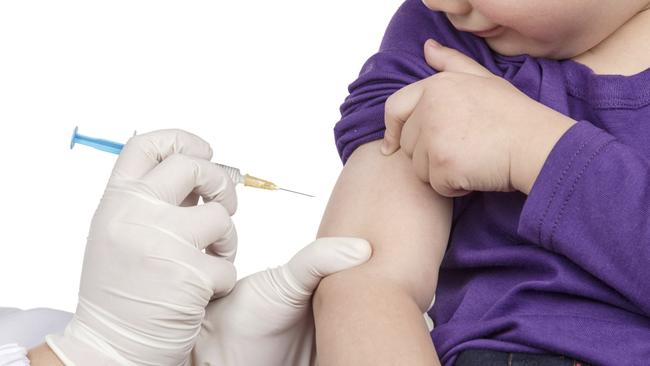No jab, no play: Unvaccinated kids face childcare ban under proposed South Australian Government laws
CHILDCARE centres would have the right to turn away unvaccinated kids under new laws being drafted by the State Government.
- Vaccination rates rise as effects of no jab, no pay policy kick in
- Free meningococcal B-strain vaccine for 60,000 high school students
- The best — and worst — Adelaide suburbs for child vaccination rates
CHILDCARE centres would have the right to turn away unvaccinated kids under new laws being drafted by the State Government.
And Health Minister Jack Snelling is still considering whether to go as far as imposing a blanket ban on unvaccinated children attending childcare.
“I’m not ruling that out at this stage. I think it warrants consideration,” Mr Snelling told The Advertiser.
“At a minimum, the legislation will make it explicit that childcare centres and kindys have an absolute right to turn away kids who are not vaccinated.”
Mr Snelling said he had been considering such a move for some time because the state’s full immunisation rate remained below 95 per cent — the level required to protect the community — but the measles outbreak in Gawler last month prompted him to act.
Latest figures, from September this year, show that 93.2 per cent of South Australian children aged five years and under were fully immunised.
The rate for the measles, mumps, and rubella vaccination was slightly higher at 94 per cent.
So far this year, there have been 11 reported cases of measles compared with four last year.
“I think South Australian parents have a right to make sure their children are being cared for in a safe environment,” Mr Snelling said.

“We protect children in kindy from a whole range of things — predators, unsafe equipment — so I think parents should not have to accept that their children could be exposed to diseases like measles, which is highly contagious.”
Some SA childcare centres already have a policy of refusing to care for unvaccinated children but Mr Snelling said he was aware of cases where centres had been taken to court by angry parents.
“(The centres) won but it should be quite clear under the Public Health Act that they have the right (to turn unvaccinated children away),” he said.
He planned to introduce the legislation into State Parliament early next year, after the Government had decided on how strict the policy would be.
In 2014, the NSW Government changed the state’s Public Health Act so children could not be enrolled at a childcare facility unless a parent or guardian provided an official record proving the child was fully immunised, or an approved exemption was provided.
The Victorian Government introduced the same rules this year.
In January, the Federal Government’s “no jab, no pay” policy came into effect, meaning families would lose welfare payments if children were not fully immunised.
“I had been concerned that legislation like that in NSW could further marginalise those children already marginalised but now I’m coming around to thinking it’s something that warrants careful consideration,” Mr Snelling said.
Australian Medical Association SA president Dr Janice Fletcher supported the move to give childcare centres the right to refuse unvaccinated children.
“But we would need to see the evidence before we supported a stance as strong as NSW,” she said.
“The more people who are vaccinated the less the disease hangs around. If we get all of the targeted population vaccinated then the disease doesn’t exist and can be eradicated in the community.”
Dr Fletcher said this was vital to protect children who were too young to be vaccinated or those with medical conditions such as cancer, which prevented them from getting a jab.
She said, for example, measles could cause significant brain damage and even death in small children and those who had a weakened immune system.
During the federal election campaign, Labor’s child development spokeswoman, Kate Ellis, wrote a strongly worded letter to her state Labor colleague Susan Close, warning that current SA laws left parents “flying blind’’ when trying protect their children from preventable diseases such as measles.
She urged the State Government to “urgently strengthen” the law to “increase vaccination rates and give parents the information they need to keep their children safe”.
Ms Ellis told The Advertiser yesterday that she was “really pleased” the State Government had taken up the issue and acted on it.
“Ultimately, this is about empowering parents to be able to make the best decisions for their children,” she said.
“Parents shouldn’t have to choose between placing their children at risk and accessing early childhood education.”
